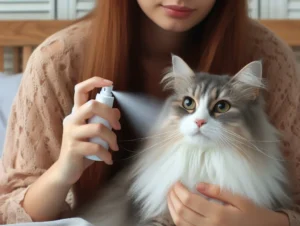Cats may be beloved pets, but when it comes to hotels, they are often not welcome. Have you ever wondered why hotels have a strict no cats policy?
Cats are not allowed in hotels for a variety of reasons, including allergies, cleanliness, and potential damage to the property.
Allergies in Guests
Did you know that approximately 10% of the population has a cat allergy? For these individuals, coming into contact with cat dander can trigger a range of symptoms, from sneezing and itching to more severe respiratory issues. Hotels strive to create a welcoming environment for all guests, which is why they often have restrictions on pets like cats. By prohibiting feline friends from staying in hotel rooms, establishments ensure that guests with allergies can enjoy a comfortable and symptom-free stay.
Cleanliness and Hygiene Standards
When it comes to maintaining high cleanliness and hygiene standards in hotels, allowing cats can present a challenge. Cats are known for shedding hair and leaving dander behind, which can lead to a buildup of allergens in the room. Additionally, cats may use the hotel room as their litter box, posing a risk of odor and sanitation issues. To uphold a clean and hygienic environment for all guests, hotels typically implement a no-pets policy or have specific rooms designated for pet-friendly accommodations.
Extra tip:
Consider choosing hotels with designated pet-friendly rooms if you plan to travel with your cat. These rooms are equipped with amenities to accommodate your furry friend while ensuring the comfort of other guests.
Potential Damage to Property
Cats, while adorable and cuddly, can also be quite mischievous. Allowing cats in hotels poses a significant risk of damage to the property. From scratching furniture to sharpening their claws on carpets, these furry creatures can cause quite a bit of chaos. Imagine coming back to your hotel room only to find torn upholstery or shredded curtains – not a pleasant sight, right? Hotels aim to maintain a certain level of cleanliness and aesthetic appeal, which can easily be compromised by allowing cats to roam freely.
Safety Concerns
Having cats in hotels can also raise safety concerns for both the feline guests and other patrons. Cats, known for their agility and curiosity, might find ways to escape from their rooms or even the hotel premises, putting themselves in danger. Additionally, there’s always a risk of cats getting into confrontations with other guests who might not be so keen on sharing their space with these furry companions. To ensure the safety and well-being of everyone involved, hotels typically have strict policies against allowing cats on the premises.
Additional Unique Insight:
Cats are also known for carrying allergens that can trigger reactions in guests who are sensitive to pet dander. By prohibiting cats from entering the premises, hotels can maintain a hypoallergenic environment for all guests, ensuring a comfortable stay for everyone.
Noise Disruption
Cats, with their playful nature and tendency to meow loudly, can pose a significant noise disruption in a hotel setting. While some guests may find the sound of a purring feline soothing, others may not appreciate being awakened at odd hours by a rowdy cat. This disturbance can lead to negative reviews and complaints, impacting the overall guest experience and potentially driving away future bookings.
Legal and Insurance Considerations
When it comes to allowing cats in hotels, legal and insurance implications play a crucial role in the decision-making process. From a legal standpoint, hotels must adhere to specific regulations and zoning laws that may restrict the presence of pets on the premises. Insurance companies also come into play, as allowing cats can increase the risk of property damage or liability claims in case of accidents or injuries involving the animals.
Additional Insight:
Hotels may choose to implement strict no-pet policies to streamline operations, minimize potential liabilities, and ensure a consistent experience for all guests. By maintaining a pet-free environment, hotels can better control noise levels, cleanliness standards, and overall guest satisfaction.
Alternative Accommodations for Cats
If you’re planning a trip and want to bring your feline friend along, consider looking into pet-friendly hotels or other lodging options. Many hotels now welcome cats, providing special amenities and services for your furry companion. You can also opt for vacation rentals, guest houses, or bed and breakfasts that allow cats to stay. Another alternative is to arrange for a pet sitter or board your cat at a reputable pet hotel while you’re away. By exploring these options, you can ensure a comfortable and enjoyable experience for both you and your cat.
Unique Trivia: Historic Reasons for No Cats in Hotels
Surprisingly, the tradition of not allowing cats in hotels dates back to ancient times when cats were associated with bad luck and superstitions. In many cultures, cats were believed to bring misfortune and were often seen as pests rather than pets. As a result, hotels historically banned cats to uphold their reputation and ensure a pleasant stay for guests. While these superstitions may no longer hold true today, some hotels still adhere to this age-old practice. Understanding this historical background sheds light on why cats have been traditionally excluded from hotel accommodations.
- Better options for travelers with cats include pet-friendly hotels or vacation rentals.
- Some hotels still abide by ancient superstitions that associate cats with bad luck.
- Cats were historically banned from hotels due to long-standing beliefs about their negative influence.
- Ensure a worry-free trip by choosing accommodations that welcome your beloved feline friend.
Alex, a passionate animal lover, has experience in training and understanding animal behavior. As a proud pet parent to two dogs and three cats, he founded AnimalReport.net to share insights from animal experts and expand his knowledge of the animal kingdom.









